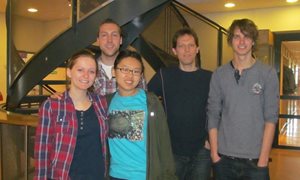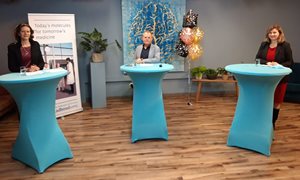
In a paper recently accepted by Clinical Cancer Research, Daan Boreel, Jan Bussink, Sandra Heskamp, theme Rare cancers, together with Paul Span, theme Women's cancers, and Gosse Adema, theme Cancer development and immune defence, reviews the therapeutic potential of decreasing the lack of oxygen (hypoxia) often found in solid tumors.
Hypoxia directly counters the efficacy of radiotherapy, and influences immune therapy by suppressing an effective immune reaction. By inhibiting oxidative phosphorylation (OXPHOS) tumor cells reduce their oxygen consumption, making them less hypoxic. This can be quantified using particular non-invasive imaging techniques, allowing for the selection of effective inhibitors in specific patients. In a more normoxic environment both radiotherapy and immunotherapy, and possibly their combination, will be more effective, allowing for potential systemic effects by reactivation of the anti-tumor immune response after radiotherapy.
Related news items

RIMLS awards call for nominations
19 October 2021 RIMLS awards several prizes to stimulate and honor our (young) researchers. Upcoming awards are Supervisor of the Year, Best Master Thesis, Best Publication, Best Image and more. Send your nominations now before 24 November 2021. go to page
Miniaturized microfluidic platform for automated epigenetic profiling
6 May 2021 Together with Fluidigm, a US-based company focusing on microfluidics, the team of Hendrik Marks publishes in Genome Research the development of a powerful plug and play ChIP-seq platform for minute amount of cells, such as embryonic specimens or small biopsies. go to page
RIMLS online award ceremony proudly presenting the winners
13 January 2021In this special webinar of the RIMLS New Year Celebration, scientific director René Bindels reviewed 2020 and looked forward to 2021. But more importantly a number of researchers received prizes in the traditional RIMLS awards ceremony.
go to page
RIMLS PhD retreat registration is open
23 January 2020 Yearly, RIMLS PhD candidates gather for the two-day PhD Retreat. Apart from the science, this event is highly valued for the opportunity to meet and get to know fellow PhD candidates during the social activities. Early bird registration and abstract submission deadline: 4 March 2020. go to page
Awarded KWF grants for Radboudumc researchers
18 December 2019 KWF is investing 2.7 million euros in five different studies at Radboudumc. The awards are part of the new round of funding by DCS, in which over 34 million euros will be granted to Dutch cancer research. We congratulate our researchers with this funding and wish them success with their great work. go to page
